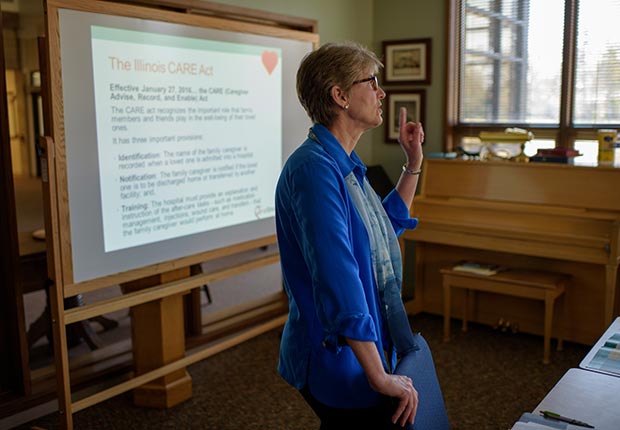AARP Hearing Center

By Lisa Bertagnoli
Three times in her life, Chris Damon has served as a caregiver to loved ones. “I know what a challenge it is,” said Damon, 66, executive director of CareSmart Illinois, a Wadsworth-based nonprofit that provides support to older adults, adults with physical and cognitive challenges, and their caregivers.
“With so many caregivers, their parents are discharged, and they don’t know what to do,” Damon said. “They’ve never been involved, and many hospitals haven’t wanted to involve family members.”
That’s why Damon advocated for passage of the Caregiver Advise, Record, Enable (CARE) Act in Illinois. Gov. Bruce Rauner (R) signed the bill last year, and the law took effect in January.
The law gives every hospital patient an opportunity to designate a family caregiver, who is to be notified when the patient is discharged home or transferred to another facility. If a patient declines to name a caregiver, that is also recorded.
The hospital also must make an effort to consult with the caregiver, through a live or recorded demonstration, on how to perform such tasks as medication management, injections, wound care and home health care.
Damon predicts the CARE Act will make care “inclusive” in Illinois. “The caregivers I work with—unless they’re really pushy—they’re very often pushed aside, in terms of being involved,” she said.
Performing complex tasks
Her clients are among the almost 1.6 million caregivers in the state who provide an estimated $18.5 billion in unpaid caregiving services to family members, according to the AARP Public Policy Institute. Nearly half of caregivers perform “complex” tasks, and almost 80 percent help manage medications, including giving injections.
In order to enable caregivers to be better informed and more effective, AARP Illinois worked with the Illinois Health and Hospital Association to bring a bipartisan CARE Act bill to unanimous passage in both chambers of the General Assembly. The bill was sponsored by State Sen. Chapin Rose (R-Mahomet) and State Rep. Jerry Costello II (D-Smithton).
Hospital executives say the CARE Act simply formalizes procedures they already had in place.
“I feel we’ve always been doing this,” said Purvi Shah, care manager at Advocate Sherman Hospital in Elgin.
For Hoa Cooper, the most important part of the law is the patient’s ability to designate an official caregiver. “Helping with the transition and understanding complex care needs when the patients go home are great ways to keep them healthy,” said Cooper, vice president of care management at Peoria-based OSF HealthCare, a nonprofit system of 11 hospitals in Illinois and Michigan.
OSF HealthCare is creating educational programs to inform its employees about the CARE Act. “We want to promote that the patient and caregiver are part of the care team,” Cooper said. “It’s a great benefit to have another set of eyes and ears to hear what has to be done after discharge.”
On July 12, AARP and the Department of Veterans Affairs’ Bob Michel Outpatient Clinic in Peoria will host a CARE Act event for veterans and their families.
Other CARE Act events will be hosted by AARP and advocates for the aging around the state.
The new law “offers caregivers the opportunity to ask questions on how to care for their loved one at home,” said Lori Hendren, AARP Illinois associate state director for advocacy and outreach. It also equips caregivers with the tools to help prevent patients from being readmitted to the hospital, she said.
The AARP workbook “Prepare to Care: A Planning Guide for Families” ( aarp.org/preparetocare) helps caregivers or those about to assume those duties.
For more information on CARE Act events, go to facebook.com/aarpillinois or call 217-522-7700.
Lisa Bertagnoli is a writer living in Chicago.































































